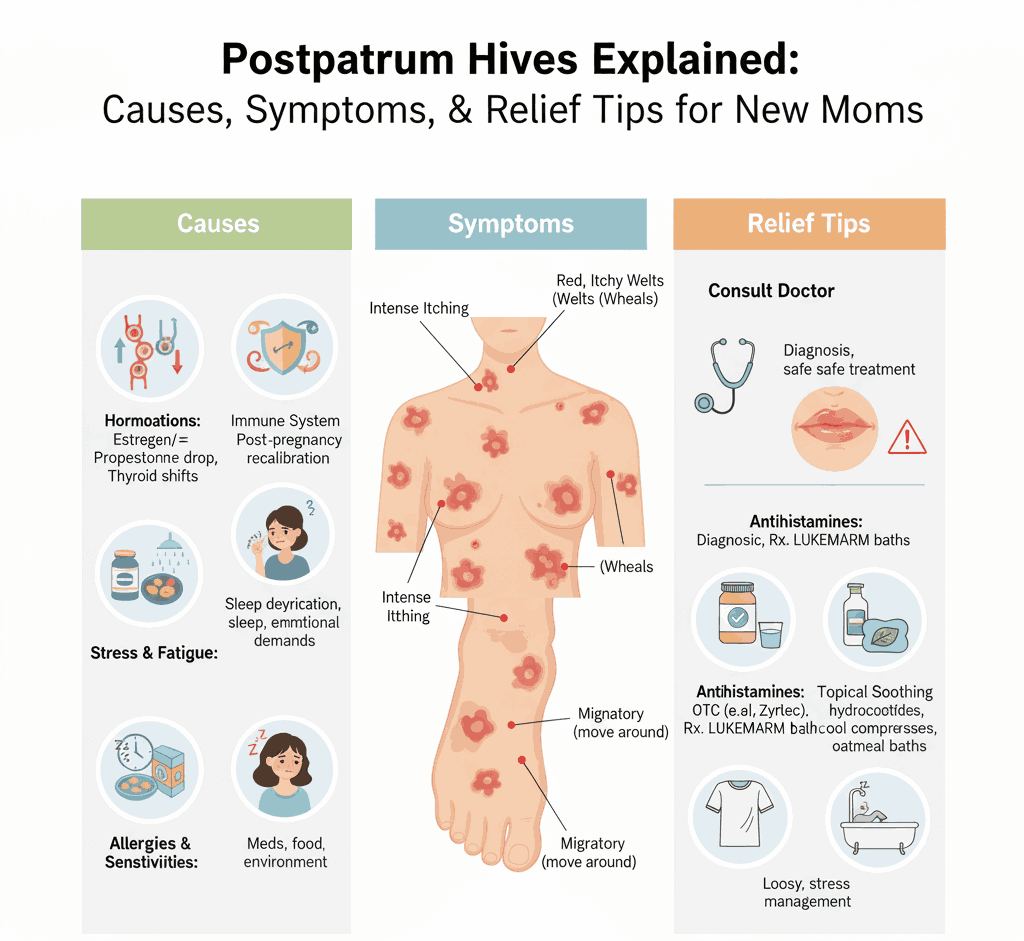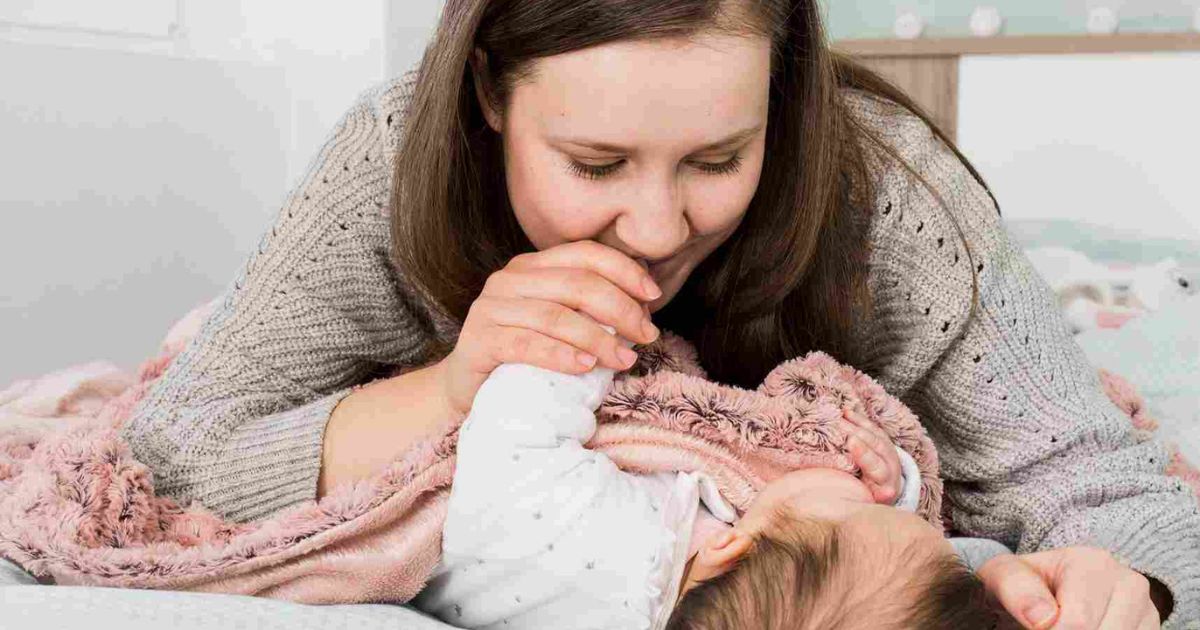What Are Postpartum Hives?
So, what exactly are these mysterious bumps? In simple terms, postpartum hives are an itchy skin rash that pops up after you’ve had a baby. The medical name for hives is urticaria, but you can just think of them as raised, often red, welts on your skin that can be incredibly itchy. They might appear on your belly, back, arms, or legs really, they can show up anywhere.
These hives happen when your body releases a chemical called histamine, which causes your skin to swell and itch. It’s the same thing that happens when you get a mosquito bite.
How are they different from other rashes?
You might have heard of another pregnancy related rash called PUPPP. While they can look similar, PUPPP typically starts late in pregnancy, often in the third trimester. Postpartum hives, on the other hand, make their grand entrance after your baby has already arrived. Knowing the difference helps you and your doctor determine the best way to relieve you.
Causes of Postpartum Hives
Figuring out why you suddenly have itchy bumps can feel like solving a puzzle, but the reasons are usually tied to the significant event your body just went through: having a baby! Here are the most common culprits behind postpartum hives.
Your Hormones Are on a Rollercoaster
After you give birth, your hormone levels, like estrogen and progesterone, take a nosedive. This dramatic shift can throw your immune system for a loop, making your skin extra sensitive and more likely to react by breaking out in hives.
Stress is Running High
Let’s be real, caring for a newborn is stressful! Lack of sleep and the emotional ups and downs can put your body under strain. This stress can trigger histamine release, leading to those unwelcome itchy welts.
New Allergic Reactions
Your body can develop new sensitivities after pregnancy. Things that never bothered you before, such as certain foods, medications you took during or after delivery, or even your laundry detergent, might suddenly cause an allergic reaction.
In rare cases, issues with liver function or other autoimmune responses can also be to blame. Your body has been through a lot; sometimes it just needs a little time to find its balance again.

Symptoms of Postpartum Hives
Knowing what to look for can help you determine whether you’re dealing with postpartum hives or something else. The symptoms can be a real nuisance, but they are usually easy to spot once you know what they are.
What Do Postpartum Hives Look and Feel Like?
The most common sign is the sudden appearance of itchy bumps, also known as welts. These can be small and singular or form larger raised skin patches. They are often incredibly itchy, and scratching can make them feel worse. You might also notice swelling around your eyes, lips, or hands.
One of the weirdest things about hives is that they can be a bit of a magic act. A welt might appear on your arm, disappear within a few hours, and reappear on your back. This shifting nature is a classic sign of this frustrating skin condition.
How to Identify Hives on Different Skin Tones
It’s important to know that postpartum hives can look different depending on skin color. On lighter skin, the welts usually appear red or pink. On darker skin tones, the hives might be the same color as the surrounding skin or look slightly lighter or darker. The key identifier for everyone is the raised texture and the itchiness, regardless of color.
When to Pay Closer Attention
Most of the time, hives are just an annoying but harmless reaction. However, if your hives are accompanied by trouble breathing, dizziness, or tongue or throat swelling, you need to seek medical help immediately. These could be signs of a more serious allergic reaction. If you’re worried, it’s always better to be safe and get checked out.
How Long Do Postpartum Hives Last?
When you’re covered in itchy bumps, one of the first questions you probably have is, “When will this go away?” It’s a totally fair question! The good news is that this annoying rash is a temporary problem for most new moms.
The Typical Timeline
An outbreak of postpartum hives will often clear up within a few days to weeks. As your hormone levels level out and your body adjusts to life after baby, your immune system calms down, and the hives usually fade away. The duration really depends on what’s causing them. If it’s a reaction to a specific food or medication, the hives will likely disappear once the trigger is out of your system.
When Hives Stick Around: Chronic Urticaria
Sometimes, the itching doesn’t stop. If your hives last for more than six weeks, you might be dealing with a condition called chronic urticaria. This doesn’t happen to everyone, but if it’s your situation, it’s a good idea to chat with your doctor. They can help you figure out if there’s an underlying issue causing the hives to hang around and find a treatment plan that finally gives you some lasting relief.
Treatment Options for Postpartum Hives
When you’re dealing with the maddening itch of postpartum hives, you want relief, and you want it fast. Luckily, there are plenty of ways to calm your skin down, from simple home tricks to medical treatments.
Medical Treatments to the Rescue
If home remedies aren’t cutting it, your doctor might suggest medication. Antihistamines are often the first choice because they block the histamine that causes the reaction. It’s super important to ask your doctor, “What’s safe for breastfeeding mothers?” as they can recommend an option that won’t affect your baby. A topical steroid cream can help reduce inflammation and itching for stubborn spots.
Soothing Home Remedies
You can manage your symptoms well at home. Applying a cool compress or taking a lukewarm oatmeal bath can provide instant relief. Some moms also find natural remedies for postpartum hives, like pure aloe vera gel, very soothing.
Small Lifestyle Changes, Big Impact
Sometimes, the best treatment is prevention. Simple lifestyle adjustments, like practicing stress management techniques (even a few minutes of deep breathing can help!), staying hydrated, and paying attention to your diet, can make a huge difference in keeping your skin calm and happy.
Prevention Tips for Postpartum Hives
While you can’t always predict how your body will react after childbirth, you can take some simple steps to lower your chances of dealing with an itchy outbreak. Think of these tips as your secret weapon against uncomfortable skin. Prevention can go a long way in keeping you focused on your new baby instead of scratching.
How to Avoid Common Triggers
One of the best ways to prevent postpartum hives is to play detective and figure out what might be causing them. Since allergic reactions are a common cause, try to pay attention to anything new in your routine.
- Food Journal: Keep a simple log of what you eat. If you notice hives popping up after you have a particular food, you might have found your trigger.
- Check Your Meds: If you started a new medication around the time the hives appeared, talk to your doctor. There might be a better alternative.
- Skincare and Laundry: Your skin is extra sensitive right now. Opt for gentle, fragrance free soaps, lotions, and laundry detergents. Sometimes, the perfumes and dyes in these products can be irritating.
Building a Postpartum Routine to Minimize Risk
Creating a calm and supportive environment for your body can do wonders for your skin. When you feel good inside, it often shows on the outside.
- Stay Cool and Comfy: Heat and sweat can worsen hives. Wear loose, breathable clothing made from soft fabrics like cotton. Keep your home at a comfortable temperature to avoid overheating.
- Keep Stress in Check: This is easier said than done with a newborn, but even five minutes of quiet time can help. Try deep breathing, listening to calming music, or asking your partner or a friend to watch the baby so you can take a quick break. Managing stress is key to keeping your immune system balanced and your skin happy.
Are Postpartum Hives Contagious?
It’s natural to worry if an itchy rash could spread to your new baby or other family members. So, let’s clear this up immediately: postpartum hives are not contagious. You can’t pass them to anyone, so there’s no need to worry about holding your little one close.
Debunking Myths About Postpartum Hives
Hives are an internal reaction, not an infection caused by a germ that can be shared. Think of it like an allergy; your body overreacts to something, but that reaction is all yours. You can continue to cuddle, feed, and care for your baby without risking them catching your rash.
How They Affect Your Baby and Family
Hives might only affect your family by making you feel uncomfortable and stressed. Finding ways to get relief is essential for your well being, which helps you be the best mom you can be. So, relax and enjoy all those baby snuggles, because your hives are one less thing you need to worry about spreading.
Find more information by visiting us:
Conclusion
Dealing with an itchy rash while caring for a newborn can feel overwhelming. Remember that postpartum hives are a typical physical response to your body’s vast changes. They’re not your fault, and they’re usually temporary.
You have many tools to manage the itch, from cool baths at home to asking your doctor for advice. Most importantly, don’t hesitate to seek help if you feel uncomfortable or worried. Taking care of your skin is part of taking care of yourself. Be patient and kind to your body as it recovers. You’re doing a fantastic job; this is just one small bump on your new journey as a mom.
FAQs
Can postpartum hives recur in future pregnancies?
It’s possible. If you experienced postpartum hives after one baby, your body might be more prone to reacting similarly after future pregnancies. This is often because the same triggers, like hormonal shifts and stress, will be present again. The good news is that now you know what to look for and can be prepared with a plan to manage symptoms if they do reappear.
What are the best skincare products for postpartum hives?
When your skin is sensitive, simplicity is best. Look for products that are fragrance free and designed for sensitive skin. Gentle cleansers, soothing moisturizers containing ingredients like oats or ceramides, and pure aloe vera gel can all help calm irritation without making things worse. Always do a small patch test before trying a new product on your entire body.
Welcome to Heel Tooth! I’m Lee Marvin.
